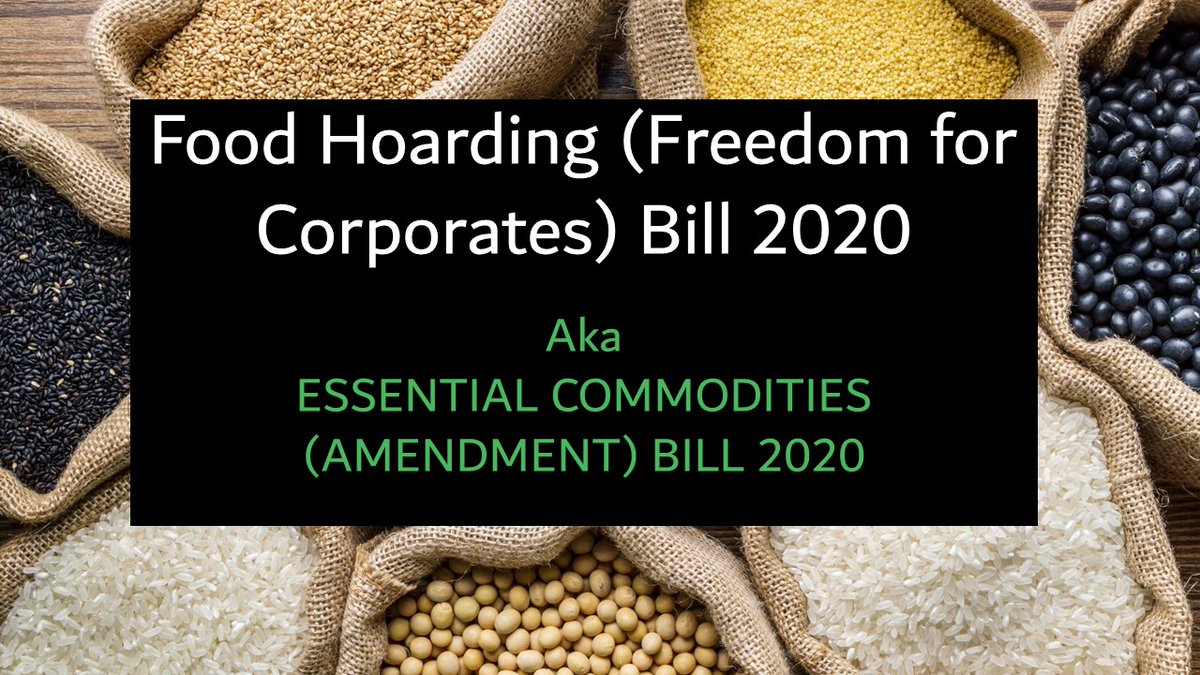Disconnect from ground, ambiguities and deficiencies galore in the APMC Bypass Bill 2020.
*farmers' freedom was not curtailed earlier either in state APMC Acts
* trader to trader transactions are being regulated now - that cannot be farmers' produce
#APMCBypassBill 1/13
*farmers' freedom was not curtailed earlier either in state APMC Acts
* trader to trader transactions are being regulated now - that cannot be farmers' produce
#APMCBypassBill 1/13
It is unclear why separate definitions and clauses have been included for Farmers’ Produce (Sec.2(a)) and Scheduled Farmers’ Produce (2 (j)) when the intention is to de-regulate both, but one category now put under state APMC Act discretion!!? #APMCBypassBill 2/13
Sec 2(d) Farmer means a person engaged in production of farming produce by self or by hired labour or ...and includes FPOs! FPOs not engaged in production & cannot be equated with Farmer. Why regulate decisions within autonomous farmers’ body with decisions made by farmers? 3/13
FPOs now put on par with existing traders & big Cos to compete in the market space. It's unclear why such over-regulation when FPO movement itself is in a nascent stage in the country, requiring the government to announce separate investments and enabling measures for them. 4/13
Govt abdicating all oversight responsibility since it is not prescribing system of registration of all traders of all farmers’ produce. Nor does it want to build a price intelligence system even as it weakens mandis. How and when will it intervene then??? #APMCBypassBill 5/13
The Bill says Central government MAY develop a price information and market intelligence system – without such a data system, can the government intervene at all and will it intervene at all? How will we know if prices are crashing significantly for farmers? #APMCBypassBill 6/13
Exploitation of farmers is understood to be only around prompt price payment without acknowledging that it is around price realisation also, and critically so as far as farmers are concerned. There are also several non-price related matters on which farmers are exploited. 7/13
The entire grievance redressal system is visualised only around prompt payments, that too based on a ‘receipt of delivery’. The entire dispute resolution/grievance redressal depends on this receipt – how many farmers will get it in “trade areas”? 8/13
How will same day payment happen for inter-state trade since dis-intermediated trade is unlikely for inter-state trade, that too without the buyer looking at samples of produce delivered. 9/13
Electronic trading like in e-NAM is riding on top of physical mandi structure in the country, not as a parallel system – if Mandis are destroyed without much trading, will e-NAM happen with farmer participation? #APMCBypassBill 10/13
Fragmented markets –many electronic platforms disconnected from each other –what will offer reference price then? Fragmented markets also mean monopsonistic markets + Fragmented regulatory structures are going to create more uneven playing field for farmers.#APMCBypassBill 11/13
In fact, the most advantaged, trade-ready and well-equipped who will operate now outside the regulated mandi and also without paying a fee in the trade area, will be the existing local traders and commission agents! They have liquidity/infra, they know the producers. 12/13
Ultimately this is going to lead to replication of old structures outside mandis. Creating 2 market spaces with 2 completely different sets of rules is a recipe for disaster. Govt will not know anything. NOT KNOWING WILL GIVE THE EXCUSE NOT TO ACT! Farmers fear this, rightly so.
• • •
Missing some Tweet in this thread? You can try to
force a refresh








